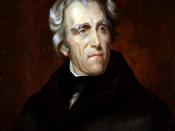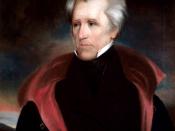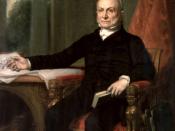The Jackson Era, running from around 1820 to 1845, was a time of rampant growth and regional diversification. Worldviews and ways of living changed as quickly as in the 20th century. Transportation was revolutionized and the foundation of a manufacturing economy was laid.
The Election of 1824 clearly showed that the "era of good feelings" had come to an end. All the candidates were Democratic-Republicans, but personal and sectional interests outweighed political orthodoxy. When results were tallied it was evident that Clay had siphoned-off enough votes from Adams to deny him an electoral majority. Adams finished with eighty-four votes, Jackson ninety-nine, Crawford forty-one and Clay thirty-seven. Jackson clearly expected to win, figuring that the House would act to authenticate his strong showing.
However, Clay, as Speaker of the House, used his authority to sway the vote to Adams. Although they were not close, Clay knew that he and Adams shared a universal political philosophy; Clay also knew that Jackson was an avowed antagonist of the Bank of the United States, a vital factor of the American System.
Clay also was not interested in doing anything to further the career of the hero of New Orleans.
The Election of 1824 had left supporters of Andrew Jackson bitterly disappointed. He had garnered the most electoral votes, but had been denied the presidency by the House of Representatives. The Election of 1828 was unique in that nominations were no longer made by Congressional caucuses, but by conventions and the state legislatures. John Quincy Adams was re-nominated by forces then calling themselves the National Republicans; his running mate was Secretary of the Treasury Richard Rush. The Democratic Republican (soon to be simply Democratic) opposition was posed by Jackson and his vice-presidential candidate, John C. Calhoun.
The campaign was the first true mud-slinging contest.


